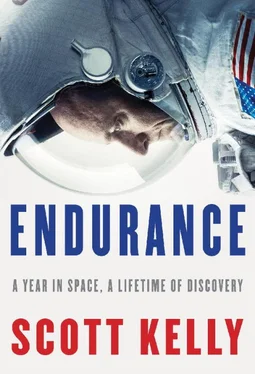“ Rebyata, ” he starts—“guys”—“can you believe we are here in space? The six of us are the only people here representing planet Earth right now, and I’m honored to be here with you. This is awesome. Let us drink to us and to our friendship.”
“To us,” the rest of us chime in, and the evening has officially begun.
It’s challenging for six people to eat together in such a small space, but we look forward to this chance to have a meal as a crew. We use Velcro and duct tape to secure our dinners, but there is always some stray item—a drink bag, a spoon, a cookie—floating away from its owner and needing to be retrieved. It becomes part of the dining experience to reach out and grab someone’s drink as it floats by your head. We listen to music while we eat, usually my playlist on the iPod I brought with me—U2, Coldplay, Bruce Springsteen. The Russians especially like Depeche Mode. Sometimes I’ll sneak in some Pink Floyd or Grateful Dead. The Russians don’t seem to mind my sixties rock, but they aren’t very interested in hip-hop even though I’ve tried multiple times to introduce them to the works of Jay Z and Eminem.
We talk about how our work has gone during the week. The Russians ask about how the Dragon capture went, and we ask them about how the next Progress resupply schedule is looking. We talk about our families and catch up on current events in our respective countries. If there is significant news involving both the United States and Russia, for instance our two countries’ involvement in Syria, we’ll touch on it lightly, but no one wants to go into any detail. Sometimes the Russians will get caught up in an American news story. For instance, when two inmates escaped from a prison in upstate New York, Gennady and Misha were fascinated with them, asking me repeatedly whether they had been captured. I would find them lingering to watch updates on CNN on our projection screen whenever they had a reason to pass through Node 1.
As the evening goes on, the Russians make their second toast, which is often about something more specific, like current events. This toast is to Dragon and the supplies it brought us. The third toast is traditionally to our wives or significant others and our families. We all stop and think of our loved ones for a moment when Anton makes this toast.
We get to talking about what it’s like to return to Earth in the Soyuz. Most of us have experienced this at least once before—Gennady has done it the most, four times—but for Terry and Samantha, their return in May will be their first time. It’s a wild ride, and the four of us who have done it share our experiences. Gennady tells a story about one of his previous Soyuz flights, when the capsule hit the ground and then rolled around quite a bit, leaving the cosmonauts with their heads below their feet. One of Gennady’s crewmates had tried to smuggle out some souvenirs in his pressure suit, and the extra cargo, along with the strange position they had landed in, left the unnamed cosmonaut with all his body weight on his groin. He was in so much distress that Gennady unstrapped himself, nearly breaking his neck when he landed on his head, in order to help reposition his crewmate and alleviate his pain. Terry and Samantha don’t look too inspired by the story.
Friday night dinners always include dessert. Russian space dessert is almost always just a can of stewed apples. We have much more variety on the U.S. segment, though our desserts aren’t gourmet level. The cherry blueberry cobbler is one of my favorites, and the chocolate pudding is always a big hit with the Russians, so I’ve brought some to share. It drives me nuts that our food specialists insist on giving us the same number of chocolate, vanilla, and butterscotch puddings, when the laws of physics dictate chocolate will disappear much faster. No one gets a vanilla craving in space (or on Earth).
We say our good nights and float back to the U.S. segment, remembering to bring our spoons and leftovers with us. Back in my CQ, I look through the plan for tomorrow, Saturday. As often happens up here, work will continue into the weekend, and I will do my required exercise sessions as well. I take off my pants and secure them under a bungee cord, don’t bother changing my shirt, and brush my teeth. I put on my headset and call Amiko to talk for a few minutes before going to sleep. It’s still early in the evening for her. I tell her about the Dragon capture, about Fifty Shades of Grey, about how the carbon dioxide is bugging me again, about Gennady’s Soyuz story. She tells me about her workday, a lot of which she spent recording an episode of NASA’s Space to Ground web series. Not long ago, she told me that her older son, Corbin, had advised her to take a break from thinking about the space station now and then. “Your work is space, and your home life is space,” he told her. “You never get away from it.” He was right. She is still helping her eighteen-year-old son, Tristan, deal with the consequences of his car having caught fire. She has also been helping my daughter Samantha and running errands for my father. I’m lucky to have Amiko taking care of things for me on the ground, and sometimes it bugs me that I can never do much to help her. This year in space is a test of endurance for Amiko as well, and it’s important for me to remember that.
—
IT’S STRANGE WAKING UP here on weekends, even more so than waking up other days, because on weekends it becomes clearer that I’m sleeping at my workplace. I wake up Saturday and I’m still at work; wake up on Sunday, still at work. Months later, I’ll still be here. On the weekends we are usually given time to do personal things—videoconference with family, catch up with personal email, read, get a little break from the relentless red line of OSTPV, and get the rest we need to start another week of long days of exacting work.
But there is a certain amount of mission creep into our time on weekends. The couple of hours of exercise on at least one day of the weekend are mandatory, since the damage to our bodies caused by weightlessness does not observe weekends or holidays. And there is station maintenance that can’t be left until Monday, or that we won’t have time to do when Monday comes around. The weekend is also when we clean, and cleaning is a bit more involved in zero gravity. On Earth, dust and lint and hair and fingernail clippings and bits of food fall, so dusting and vacuuming get rid of pretty much everything. On the space station, a piece of dirt can wind up on the wall, the ceiling, or attached to an expensive piece of equipment. A lot of crap winds up on the filters of the ventilation system, and when too much of it starts to build up, our air circulation is affected. Because the walls get dirty and wet, mold is a concern. And because mold spores don’t fall to the floor but linger in our breathable air, they can pose a serious health risk. As a result, we are expected to clean most everything on station we regularly touch every weekend, with a vacuum and antiseptic wipes. We also take samples from the walls to grow in petri dishes and send back to Earth for analysis. So far they haven’t found anything toxic, but it’s both disgusting and fascinating to see what we are cultivating on the walls.
Then there’s the Saturday morning science. When I was up here four years ago, there was an option to participate in additional science work on Saturday mornings, an idea introduced by an astronaut colleague who wanted to volunteer some of his free time to work on experiments that would otherwise go neglected. Since then, astronauts with a special interest in science could participate in Saturday morning science, and those who had other interests, or who—like me—felt they needed time to recover from the stress of the week in order to be ready for emergency situations, were under no pressure to do so. Now Saturday morning science no longer seems optional. In addition to all that, we need to start unpacking Dragon’s cargo. Some of the cargo on Dragon is time sensitive (live mice and fresh vegetables, most notably). Once everyone is up and caffeinated, Terry and Samantha meet me in Node 2. We arm ourselves with checklists and cameras—a still camera to document each step of our work for later analysis by NASA and SpaceX, and a video camera so mission control can see exactly what we’re doing in real time. When we’re ready, we call down to the ground so they can follow along with us.
Читать дальше












